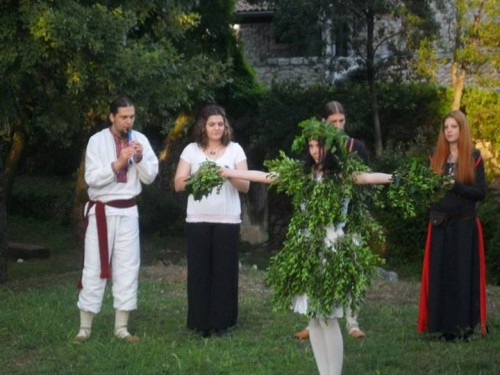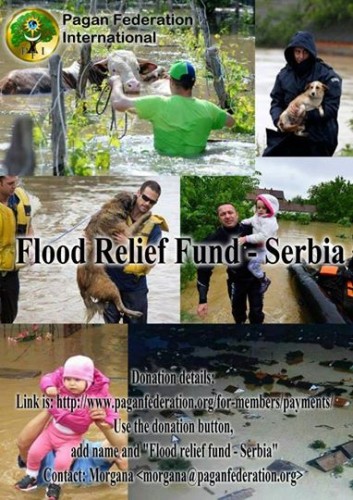EASTERN EUROPE — The Balkan region of Eastern Europe is suffering under the pressure of extreme floodwaters unlike anything they have seen in recent decades. Serbia and Bosnia have been the hardest hit as waters from the River Sava and River Danube swell well beyond their banks. The area has been declared a disaster zone with rising casualties and “tens of thousands” homeless. Now that storm waters have now crested and damage is being assessed, the Pagan Federation International (PFI) divisions in both Croatia and Serbia have stepped in to help their countries recover.
![Flooded town [Photo Credit: PFI - Serbia]](https://wildhunt.org/wp-content/uploads/2014/05/10345766_10152846512539447_6015137963946396272_n-500x281.jpg)
Flooded town [Photo Credit: PFI – Serbia]
When the water goes, the sickness will start. We will need to clean this place… and vaccinate people. We will need money to rebuild homes and [repair] the damages. We will need animals and plants to cover the harvest and help the agricultural people. We will be able to get help and cover this stuff, but nobody will bring back the loved ones – dead relatives and dear pets.
In the coming weeks, PFI Serbia will be organizing various outreach projects and fundraisers in an effort to increase aid for the recovery process. Some of these projects include Internet-based sales of handmade metaphysical objects such as spells and statuettes.They will offer spiritual consulting, divinations, workshops and spell casting. Marko also notes that PFI Serbia will be performing “rituals for the living and the dead.” These prayers and workings will be posted on PFI Serbia’s Facebook page for worldwide participation.
![[Photo Credit: Sebian Government "HelpSaveSerbia" #SerbiaFloods Campaign]](https://wildhunt.org/wp-content/uploads/2014/05/10372043_461995833936018_3172968926362696389_n-500x306.jpg)
[Photo Credit: Sebian Government “HelpSaveSerbia” #SerbiaFloods Campaign]
After having lost everything [the owners] want to save the last thing that is left, which are their furry friends and partners. Still man and beast have that primal bond, [whether] it be their companion animals or the cow in the barn, there is a connection.
Anita is an active member of an animal rights group and helping in this way came naturally. Over the past few days, she has noticed growing solidarity among the Croatian population. She says:
It is amazing how many people are ready to help, how many donations and helping hands come up in times of crisis. It is said that in times of crisis the churches are crowded, maybe true, but also people suddenly feel connected again, realizing obviously that we are one huge tribe and must stick together.
That is a big statement coming from a region that has seen decades, even centuries, of cultural and ethnic strife. Reminders of that deeply embedded conflict are being dredge up, literally, by the floodwaters in the form of Bosnian landmines. On Thursday one of these mines detonated near Belgrade. Fortunately nobody was injured but thousands of mines still remain.
![The band Svarica [Photo Credit: The Association of Perunova Svetinja]](https://wildhunt.org/wp-content/uploads/2014/05/555531_10151071475213025_22319001_n-500x316.jpg)
The band Svarica [Photo Credit: The Association of Perunova Svetinja]
In Serbia the three dominant Pagan and Heathen practices are Rodnovery, the Old Balkan Goddess-based religion and other local folk traditions. As Marko explains, there was never an inquisition in Serbia which allowed the old ways to survive. In some cases the folk traditions were incorporated into Christianity. In other cases, they were practiced in the home behind closed doors. To this day healers and folk priestesses still operate and thrive in the mountains of eastern Serbia. Marko explains further:
In recent years people have started to believe more and more in Mother Goddess, and also the cult of Hekate (as old Thracian goddess, Balkan goddess) has become stronger as we are the crossroad of the world … In the eastern part of Serbia there are people called Vlach who still believe and pray to Muma Paduri or Samodiva (Forest Mother). She is an important part of all magical practice and worship … The old religion is still alive and practiced even with a bit of influence from modern occult works and beliefs.
Croatia is also a predominantly Christian country in which ancient folk traditions have survived. In this country the dominant Pagan and Heathen practices here are Rodnovery, the Slavic Movement focused around the God Perun, and Wicca. Anita adds:
It seems to me that more and more Pagans that started off with Wicca … now seek their biological-spiritual roots and the ways of the old Slavic traditions. And these traditions are beautiful, filled with myths and wisdom, spinning around Dažbog, the Slavic sun god; Morana, the Goddess of harvest, witchcraft, winter and death; Svetovid, God of war, fertility and abundance and Vesna, Goddess of spring and nature.
Although the global usage of the term Pagan or Heathen is understood within these communities, local practitioners of the old ways generally do not use either label themselves. Co-Founder of the Association of Perunova Svetinja and the Alliance of Croatian Rodnovers Žrec Svetoslav explains that “We don’t call ourselves “pagan,” because its meaning does not suit us …We believe this term is discriminatory.”
As Anita explains, the term Pagan is often associated with derogatory imagery coming out of old legends such as Baba Yaga. Moreover, in this culture, the term also suggests a new religion which does not apply to the revival of their native folk practice. Marko says that people consider themselves to be part of “an old religion of ancestral fate” whether that tradition is Slavic, proto-Croatian, Serbian or another folk practice.*

Traditional Dodola Ritual [Photo Credit: The Association of Perunova Svetinja]
Another mission of PFI-Croatia is “to unite Pagans and Heathens” and “to live in unity in diversity.” Anita says, “I often get the feeling that people here try to do things on their own, separating from others to become leaders or bosses, instead of working together.” She wants to see this change and the flooding appears to be demonstrating that it is possible. People are coming together.
Morgana Sythove, the International Coordinator for the Pagan Federation International, says, “As a [global] organization we try to emphasize the principle of solidarity and to look beyond political differences. This is not always easy since we as Pagans are also marginalized and discriminated against.” She adds that PFI’s supports the motto: “Think globally, act locally” and encourages all the PFI divisions to interface and include the community in any work. She adds, “For some people we are a lifeline in a very unfriendly world.” During crisis, this becomes even more true.

Both Marko and Anita will continue to coordinate PFI’s efforts to offer disaster relief in those countries. Marko says, “[Serbia] was in bad economic situation before, but now we are destroyed. Being helped by Pagan community means new age for old Europe.” He stresses how important this region is with its ancient sites and beautiful terrain. He welcomes all Pagans to visit his country and share in its spirit. In the meantime, Marko hopes that everyone, of any faith, will join PFI Serbia and Croatia in their healing work through prayer and ritual.
*Note: The PFI Coordinators and others do use the term Pagan for ease of discussion and understanding. This article follows that lead in using the term to communicate the story.
The Wild Hunt is not responsible for links to external content.
To join a conversation on this post:
Visit our The Wild Hunt subreddit! Point your favorite browser to https://www.reddit.com/r/The_Wild_Hunt_News/, then click “JOIN”. Make sure to click the bell, too, to be notified of new articles posted to our subreddit.
The Christian religious majority in Serbia is not Catholic, it’s Serbian Orthodox. This is one of the things that has always separated the Serbs from the Croatians, i.e. the latter are Catholic, whereas the former are Orthodox.
Thanks for pointing out that error. You are absolutely correct. I had intended to use the word “Christian” but that edit got lost along the way. The change has been made.
It’s heartening that Serbs and Croats are working in harmony against a common threat, and a source of pride that they do so under the banner of indigenous religion. But what struck me is the photo of the cat riding the dog through high water!
Many thanks Heather for your report! The waters are now reclining but as Marko pointed out there will now be the problems of disease etc. And the clean-up 🙁 For updates please check out: http://www.forum.paganfederation.org/viewtopic.php?t=4921
We will continue to raise funds to try and alleviate some of the distress caused by the floods. Thanks again for your help! (PS PFI is active in Croatia and Serbia but of course many us will support the efforts for Bosnia too.)
Morgana glad to see PFI are getting a write here on The Wild Hunt it is a respected news source in our part of the Pagan World.